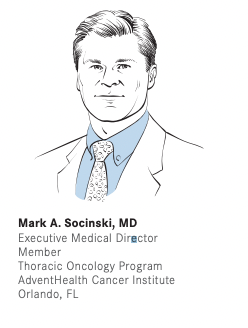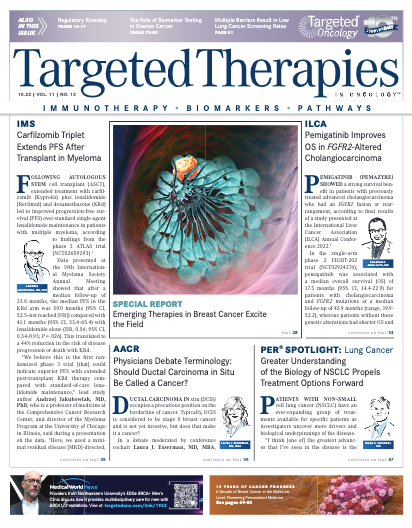Greater Understanding of the Biology of NSCLC Propels Treatment Options Forward
Prior to the 20th Annual Winter Lung Cancer Conference, Mark A. Socinski, MD, spoke with Targeted Therapies in Oncology about expectations for the upcoming meeting and major topics in non–small cell lung cancer.

Patients with non–small cell lung cancer (NSCLC) have an ever-expanding group of treatments available for specific patients as investigators uncover more drivers and biological underpinnings of the disease.
“I think [one of] the greatest advances that I’ve seen in the disease is the understanding of the biology of the disease—being able to take the pie that we used to call non–small cell lung cancer and divide it up into various pieces…understanding that it’s more of a personalized approach because of our understanding of the underlying biology of the disease,” Mark A. Socinski, MD, said in an interview with Targeted Therapies in Oncology™.
Socinski, executive medical director and member of the Thoracic Oncology Program at AdventHealth Cancer Institute, is the co-chair for the 20th Annual Winter Lung Cancer Conference® taking place February 3 to 5, 2023, in Hollywood, Florida, and virtually. He will be joined by co-chairs Julie R. Brahmer, MD, MSc, FASCO, and Rogerio C. Lilenbaum, MD.
Prior to the meeting, Socinski spoke with Targeted Therapies in Oncology™ about expectations for the upcoming meeting and major topics in NSCLC.
Targeted Therapies Increasing options in targeted therapies will be a significant topic of discussion on both the second and third days of the conference, with Socinski moderating both targeted therapy sessions.
Targets and targeted therapy options continue to expand in NSCLC, with the welcome addition of sotorasib (Lumakras) in 2021 for the treatment of adult patients with locally advanced or metastatic NSCLC harboring a KRAS G12C mutation.1 Additionally, trastuzumab deruxtecan (Enhertu) received an accelerated approval from the FDA in August 2022 for patients with pretreated HER2- mutant unresectable or metastatic NSCLC.2
Updated data for sotorasib in KRAS-mutant NSCLC, presented at the European Society for Medical Oncology (ESMO) Annual Congress 2022, showed that the KRAS inhibitor induced a 12-month progression-free survival (PFS) rate of 24.8% compared with 10.1% with docetaxel chemotherapy. The median PFS was 5.6 months with sotorasib and 4.5 months with chemotherapy (HR, 0.66; 95% CI, 0.51-0.86; P = .002) in pretreated patients in the phase 3 CodeBreak 200 trial (NCT04303780).3
Trastuzumab deruxtecan was approved in lung cancer following the results of the phase 2 DESTINY-Lung01 trial (NCT03505710). In the study, patients with metastatic HER2-mutant NSCLC who were refractory to standard therapy achieved a 55% objective response rate (95% CI, 44%-65%) and a duration of response of 9.3 months (95% CI, 5.7-14.7). The median PFS was 8.2 months (95% CI, 6.0-11.9) and the median overall survival (OS) was 17.8 months (95% CI, 13.8-22.1).4
“Lung cancer has become the poster child for targeted therapy, and that’s led to the benefit that we’re seeing in the overall survival figures that we’ve seen in non–small cell lung cancer. That’s been the biggest change over that period of time, [which] allows us the ability to select the right treatment for the right patient, at the right time, realizing that not every new drug is going to work in everybody,” Socinski said.
Whenever genetic testing identifi es a driver mutation, guidelines and best practices recommend the use of such targeted therapies. “I always say that a target trumps everything,” Socinski commented.
The benefits of targeted therapy hardly require a debate, but there are still areas with questions that deserve further discussion. For several targeted therapies, including trastuzumab deruxtecan, the indication is for the second line or later. The question remains what to give these patients until they can receive these more targeted approaches.
Although immunotherapy agents have shown considerable benefit in patients with NSCLC, patients with driver mutations tend to show significantly less benefit with immune checkpoint inhibitors. Responses and survival rates do tend to differ according to the mutation,5 but, in general, immunotherapy is not recommended prior to the use of targeted therapy as responses can be lower and toxicity higher for patients with driver mutations.6,7
“For the most part, immunotherapy is not very efficacious in these subsets relative to the targeted therapeutic options for patients,” Socinski said.
The best approach forward for patients with and without driver mutations will be discussed during the conference in both multidisciplinary tumor boards and presentations.
Neoadjuvant/Adjuvant Therapy
Among other topics up for discussion during the Winter Lung Cancer Conference® is how neoadjuvant and adjuvant therapy should be integrated into clinical practice for patients with NSCLC.
New data are emerging for the use of immunotherapy and targeted therapy agents prior to and/or post surgery for patients with earlier stages of disease.
At the 2022 American Society of Clinical Oncology (ASCO) Annual Meeting, among the significant findings discussed was that of the open-label phase 3 CheckMate 816 trial (NCT02998528), which explored the use of nivolumab (Opdivo) plus platinum-based chemotherapy compared with chemotherapy alone prior to surgery in patients with stage IB to IIIA resectable NSCLC.8
Median event-free survival, the primary end point of the trial, with neoadjuvant chemoimmunotherapy was 31.6 months (95% CI, 30.2-not reached) compared with 20.8 months (95% CI, 14.0-26.7) with chemotherapy alone (HR, 0.63; 97.38% CI, 0.43-0.91; P = .05).9
Pathologic complete response rates were 24.0% (95% CI, 18.0%-31.0%) and 2.2% (95% CI, 0.6%-5.6%) with nivolumab and chemotherapy vs chemotherapy, respectively (odds ratio, 13.94; 99% CI, 3.49-55.75; P < .01).
OS was not considered significant at the time of the interim analysis.
Following neoadjuvant therapy, 83.2% of patients in the chemoimmunotherapy arm and 75.4% of the chemotherapy arm were able to undergo surgery.
In March 2022, the FDA approved the combination of neoadjuvant nivolumab and chemotherapy for adult patients with resectable NSCLC.10 Socinski said the study (and the approval) bring up “a lot of interesting questions and makes you rethink how we’re going to incorporate this into practice.”
The single-arm phase 2 NADIM trial (NCT03081689), whose data were also presented at the ASCO meeting, also explored the use of neoadjuvant nivolumab and paclitaxel and carboplatin chemotherapy in patients with stage IIIA resectable NSCLC.11
At 36 months, the OS rate was 81.9% (95% CI, 66.8%-90.6%) in the overall population and 91.0% (95% CI, 74.2%-97.0%) in the per-protocol population.
Additionally, circulating tumor DNA levels in the study were significantly associated with PFS and OS.
“[The findings come] on the heels of having some adjuvant data as well as an adjuvant FDA approval in the adjuvant setting, and so it responds much like PACIFIC did [for] stage III [disease],” Socinski commented. “This restarts the debate about neoadjuvant vs adjuvant, who’s the appropriate patient for which approach and these sorts of things.”
At the ESMO Congress, updated data from the phase 3 ADAURA study (NCT02511106) were presented that confirmed the role of adjuvant osimertinib (Tagrisso) in patients with EGFR-mutated, stage I to IIIA NSCLC.12
The median disease-free survival was 65.8 months (95% CI, 54.4-not calculable) with osimertinib vs 28.1 months (95% CI, 22.1-35.0) with placebo (HR, 0.27; 95% CI, 0.21-0.34).
“The opportunity to escalate from therapies that work well in stage IV into what we consider more of a curative setting—the surgical setting, stage III disease—that’s exactly what we need to do. We’re beginning to see some of the payoff of that from various trials,” Socinski said. “The data we have to date [show] that there’s a role for immunotherapy in the neoadjuvant or adjuvant setting, there’s a role for osimertinib in the adjuvant setting, if you have an EGFR mutation.... We’re going to see more of that as we move forward.”
These data and those from other studies will help turn discussion—and potentially clinical practice toward the use of neoadjuvant and adjuvant therapies for patients with resectable NSCLC.
REFERENCES
1. FDA grants accelerated approval to sotorasib for KRAS G12C mutated NSCLC. FDA. May 28, 2021. Accessed September 19, 2022. https://bit.ly/3S3BD3s
2. FDA grants accelerated approval to fam-trastuzumab deruxtecan-nxki for HER2-mutant non-small cell lung cancer. FDA. Updated August 16, 2022. Accessed September 19, 2022. https://bit.ly/3f82cG5
3. Johnson ML, De Langen J, Waterhouse DM, et al. Sotorasib versus docetaxel for previously treated non-small cell lung cancer with KRAS G12C mutation: CodeBreaK 200 phase III study. Ann Oncol. 2022;33(suppl 7):S808-S869. doi:10.1016/j.annonc.2022.08.051
4. Li BT, Smit EF, Goto Y, et al; DESTINY-Lung01 Trial Investigators. Trastuzumab deruxtecan in HER2-mutant non–small-cell lung cancer. N Engl J Med. 2022;386(3):241-251. doi:10.1056/NEJMoa2112431
5. Mazieres J, Drilon AE, Mhanna L, et al. Effi cacy of immune-checkpoint inhibitors (ICI) in non-small cell lung cancer (NSCLC) patients harboring activating molecular alterations (ImmunoTarget). J Clin Oncol. 2018;36(suppl 15):9010. doi:10.1200/JCO.2018.36.15_suppl.9010
6. McCoach CE. A cautionary analysis of immunotherapy prior to targeted therapy. J Thorac Oncol. 2019;14(1):8-10. doi:10.1016/j. jtho.2018.10.009
7. Lisberg A, Cummings A, Goldman JW, et al. A phase II study of pembrolizumab in EGFR-mutant, PD-L1+, tyrosine kinase inhibitor naïve patients with advanced NSCLC. J Thorac Oncol. 2018;13(8):1138- 1145. doi:10.1016/j.jtho.2018.03.035
8. Provencio-Pulla M, Spicer J, Taube JM, et al. Neoadjuvant nivolumab (NIVO) + platinum-doublet chemotherapy (chemo) versus chemo for resectable (IB–IIIA) non-small cell lung cancer (NSCLC): association of pathological regression with event-free survival (EFS) in CheckMate 816. J Clin Oncol. 2022;40(suppl 17):LBA8511. doi:10.1200/ JCO.2022.40.17_suppl.LBA8511
9. Forde PM, Spicer J, Lu S, et al; CheckMate 816 Investigators. Neoadjuvant nivolumab plus chemotherapy in resectable lung cancer. N Engl J Med. 2022;386(21):1973-1985. doi:10.1056/NEJMoa2202170
10. U.S. Food and Drug Administration approves Opdivo (nivolumab) with chemotherapy as neoadjuvant treatment for certain adult patients with resectable non-small cell lung cancer. News release. Bristol Myers Squibb. March 4, 2022. Accessed September 19, 2022. https://bit.ly/3MmyokZ
11. Provencio M, Serna-Blasco R, Nadal E, et al. Overall survival and biomarker analysis of neoadjuvant nivolumab plus chemotherapy in operable stage IIIA non–small-cell lung cancer (NADIM phase II trial). J Clin Oncol. 2022;40(25):2924-2933. doi:10.1200/JCO.21.02660
12. Tsuboi M, Wu Y, Grohe C, et al. Osimertinib as adjuvant therapy in patients (pts) with resected EGFR-mutated (EGFRm) stage IB-IIIA nonsmall cell lung cancer (NSCLC): updated results from ADAURA. Ann Oncol. 2022;33(suppl 7):S808-S869. doi:10.1016/annonc/annonc1089

Gasparetto Explains Rationale for Quadruplet Front Line in Transplant-Ineligible Myeloma
February 22nd 2025In a Community Case Forum in partnership with the North Carolina Oncology Association, Cristina Gasparetto, MD, discussed the CEPHEUS, IMROZ, and BENEFIT trials of treatment for transplant-ineligible newly diagnosed multiple myeloma.
Read More
Key Trials From ASH 2024 Impact Treatment for Plasma Cell Disorders Going Forward
February 20th 2025Peers & Perspectives in Oncology editorial board member Marc J. Braunstein, MD, PhD, FACP, discussed the significant advancements in multiple myeloma treatment at the 2024 ASH Annual Meeting and Exposition.
Read More